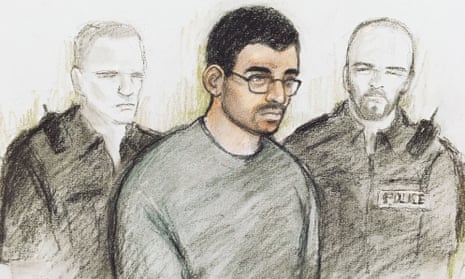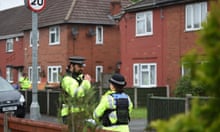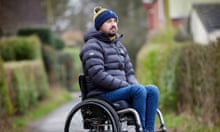It took more than two years for British diplomats to secure the extradition of Hashem Abedi, the brother of the Manchester Arena bomber, amid claims the UK government paid £9m in “bribery” aid and was complicit in his torture under Boris Johnson’s watch as foreign secretary.
Abedi, now 22, the younger of the two brothers, was arrested in Libya alongside his father, Ramadan, shortly after his older brother, Salman, carried out the attack on 22 May 2017.
Counter-terrorism officers had been granted a warrant for Abedi’s arrest – so he could face mass murder charges for his role in planning the deadliest terrorist attack on UK soil since the 7/7 bombings – but it would take them years to negotiate his extradition.
In closed court hearings, which could not be reported under UK law until the jury reached its verdict, the British government was accused of bribing Libyan authorities with a multimillion pound aid deal in return for Abedi’s extradition.
Abedi was finally extradited in July 2019, almost two years after Boris Johnson – the then foreign secretary – visited Tripoli and allegedly offered a £9.2mpackage to help Libya deal with the terrorist threat and tackle illegal migration.
During the visit in August 2017, Johnson’s second to the country in less than six months, he met the prime minister, Fayyez Al-Serraj, the foreign minister, Mohamed Siala, and the president of Libya’s high state council, Abdurrahman Swehli. The four men discussed how the UK could support Libya in combating terrorism.
However, Abedi’s barrister, Stephen Kamlish, told the Old Bailey in London that the aid money was a bribe to secure his client’s extradition, and that the process had been illegal under Libyan law.
“The British were effectively having to bribe the Libyans,” he said.
After their arrest, Abedi and his father were held by Rada Special Deterrence Force, the most powerful of Tripoli’s militias, at its base at Mitiga airport alongside dozens of other terrorist suspects and fighters. With the jail being repeatedly attacked by rival militias trying to free their members, the race to extradite Abedi to the UK began.
In October 2017, the then British ambassador to Libya, Peter Millett, handed over extradition documents to the Libyan attorney general beginning the “long drawn-out process”.
One of the obstacles was that the extradition request was made under a treaty, signed during the Muammar Gaddafi era, which does not allow Libya to extradite its own nationals to the UK.
One western source said Abedi had entered Libya on a British passport, and that Libya’s justice officials had eventually decided he could be regarded as British and extradited within the terms of the treaty.
In an account reminiscent of episodes in which British security services were implicated in serious human rights abuses in the years after 9/11, Abedi claimed he was held in solitary confinement from the moment he was arrested. Shackled and blindfolded, he was allegedly forced to sign a 40-page confession with a fingerprint under “extreme duress”.
Officers from MI5 and MI6 visited him twice at the detention centre that his British lawyers described as “a torture establishment”.
His claims of torture were supported by medical evidence, including photographs taken by a British consular official showing marks on his back, arms and ankles. He is also said to have been taken from the detention centre to a clinic for treatment to a groin injury.
Kamlish said MI5 and MI6 must have known Abedi was being tortured but they continued to feed questions to his torturers on key aspects of the UK investigation.
He said: “He was arrested the day after the bombing, and until the end of May he was asked questions about people in Manchester and addresses, none of which could have been known to his [Libyan] torturers – it would not have been possible.
“They must have received the questions from either Operation Manteline [the name of the Manchester bombing investigation] or the security services or both. Those questions under torture went on for almost a month.”
Abedi’s older brother, Ismail, who remained in the UK, had alerted the British government that his sibling and father were being tortured in Libyan custody.
At one point, Kamlish said, British intelligence officers questioned Abedi in the presence of members of the militia that was allegedly torturing him. After Abedi signed the confession on 23 June 2017 the worst of the torture allegedly ceased, the court was told.
Kamlish alleged the extradition in conjunction with Abedi’s torture amounted to an abuse of process and called for the trial to be halted.
The prosecuting lawyers did not deny the allegation of British complicity in Abedi’s torture but went on to successfully argue that his trial should proceed regardless of his treatment in Tripoli.
In the aftermath of 9/11, British intelligence officers were repeatedly implicated in involvement with intelligence agencies known to use torture, but these allegations were routinely denied by the government.
However, the UK parliament’s intelligence and security committee confirmed in 2018 that MI5 and MI6 officers had engaged in human rights abuses, but concluded these abuses were a historical issue.
An apology was issued to a Libyan couple for the British security services’ involvement in their kidnap and rendition to Tripoli, and a second Libyan family received an out-of-court settlement after bringing proceedings over MI6’s involvement in their kidnap.
Since 2017, a judge known as the investigatory powers commissioner has been responsible for reporting to the government on whether intelligence officers are following the appropriate guidance. However, his report covering the period when Abedi was allegedly being tortured raised no serious concerns.









